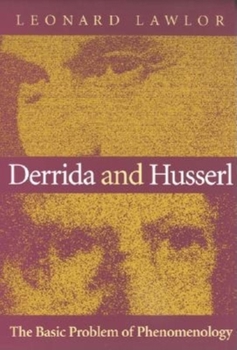Derrida and Husserl: The Basic Problem of Phenomenology
" A] magnificent work . . . that will definitely shape the discussion on Derrida for years to come." --Rodolphe Gasch
What is the nature of the relationship of Jacques Derrida and deconstruction to Edmund Husserl and phenomenology? Is deconstruction a radical departure from phenomenology or does it trace its origins to the phenomenological project? In Derrida and Husserl, Leonard Lawlor illuminates Husserl's influence on the French philosophical...
Format:Paperback
Language:English
ISBN:0253215080
ISBN13:9780253215086
Release Date:June 2002
Publisher:Indiana University Press
Length:304 Pages
Weight:0.94 lbs.
Dimensions:0.8" x 5.8" x 9.2"
Related Subjects
PhilosophyCustomer Reviews
3 ratings
Unrepeatable
Published by Thriftbooks.com User , 18 years ago
With a few small but ancillary reservations, this study is dazzlingly masterful. Lawlor cogently traces Derrida's development as an interpreter of Husserl and convincingly maps the influences which helped effect his thought. What impressed me most is that Lawlor accomplishes this without utterly reducing Derrida to these influences. In all the secondary lit I've read, Lawlor's is unmatched as an opening onto to Derrida's work. The 2 reservations I have with Lawlor's treatment hover around what may be a common root. Lawlor claims to be `defending the Derridain faith,' a necessarily problematic statement. This statement began to make more sense to me as Lawlor begins positing - or if you like, foregrounding - a specific (admittedly VERY specific) Derridain concept of `experience.' Many readers of Derrida could justifiably bulk at this suggestion, given that Derrida has severely problematized the concept of experience whether as Erlebnis or Erfahrung. Yet there seems to be some plausibility to Lawlor's suggestion. At this point, however, I'm not sure I am competent enough to evaluate. In any event, it may come down to a debate between your "phenomenological" Derridians and you "structuralist" Derridians. Of course we know that this disjunction is just plain false. But it is interesting in that those who tend to talk about the "experience of the impossible" usually read Derrida *through and with* Husserl, Heidegger, Hegel, and Levinas, while those who remain a bit skeptical of the "ethical turn" tend to read him *through and with* Saussure and Nietzsche. It is not so much an opposition but a difference of emphasis that may well lead, with time, to a broadening fissure. Given that this text approaches Derrida as a Husserl interpreter, we should not be surprised on the moment of a specific `experience.' In any event, as with a few other of your "phenomenological" Derridians (e.g. Caputo, etc.), one spots momentary glimmers of Lawlor's own project beneath the fabric he weaves in this text. Both as a rigorous exposition of Derrida's development and as an innovative reading foregrounding new foci, this book is a must read!
A Peerless Study of Derrida on Husserl
Published by Thriftbooks.com User , 18 years ago
This work is an excellent explication of the relation of Derrida to Husserl. The arguments set forth, though detailed, are both clear and cogent. And since this relation is of such central importance to Derrida's thought, it sheds light on the whole of his work. Lawlor begins by investigating the problem of genesis in Eugen Fink's Kantstudien essay "The Phenomenological Philosophy of Edmund Husserl and Contemporary Criticism," works through the Derrida's essay "'Genesis and Structure' and Phenomenology," and examines the most important aspects of Derrida's _Le problème de la genése dans la philosophie de Husserl_ and his "Introduction" to his translation of Husserl's "Origin of Geometry." He then shows how the early problematic of genesis becomes the later problematic of sign in _Voice and Phenomena_. Finally, Lawlor rounds off his investigation with an analysis of Derrida's "turn" from an emphasis on metaphysics (Derrida's famous critique of presence) to ethics and politics in his investigation of _Specters of Marx_. The reviewer below who claimed that Lawlor's work "fails to grasp its subject matter" could not be more wrong. Apparently, he never read the book. Lawlor takes great pains to explain the role of repetition, and substitution in Derrida's critique of Husserl. In fact, I know of no study (in English or otherwise) that comes close to Lawlor's detailed analysis of this critique. As a final note, one should not presume that this work could serve as an introduction to Derrida in the sense that it is a basic work. It is not. While a thorough understanding of Derrida is not presupposed, it is imperative that one has a good grasp of Husserl's own position before reading this book. For the purposes of understanding the debate between Husserl and Derrida I would recommend reading Robert Sokolowski's _Husserlian Meditations_, since it covers the whole gamut of Husserlian doctrines from presence and absence to signs and sensibility.
Extremely Helpful Analysis of Derrida
Published by Thriftbooks.com User , 18 years ago
This is a rigorous and clear presentation of Derrida's fundamental argument/insight. Lawlor's strategy is to map out carefully the history of Derrida's engagement with Husserl in Derrida's formative period (1954-1967), and to use this development as the key to the interpretation of Derrida's thought. Lawlor is able to make Derrida clear and compelling, while dispelling many familiar prejudices; he simultaneously demonstrates the strength of Husserl's thought, against the facile claim that Derrida's deconstruction is a rejection of Husserlian phenomenology. This is a demanding book to read, because it presupposes a reader with fairly advanced knowledge of--or at least familiarity with--Derrida, Husserl, Heidegger and Levinas, but for such readers this should be mandatory reading. I recommend this work very highly to any serious student of contemporary European philosophy. (Good complementary texts would include Jay Lampert, _Synthesis and Backwards Reference in Husserl's Logical Investigations_, and Miguel de Beistegui, _Thinking with Heidegger_.)




